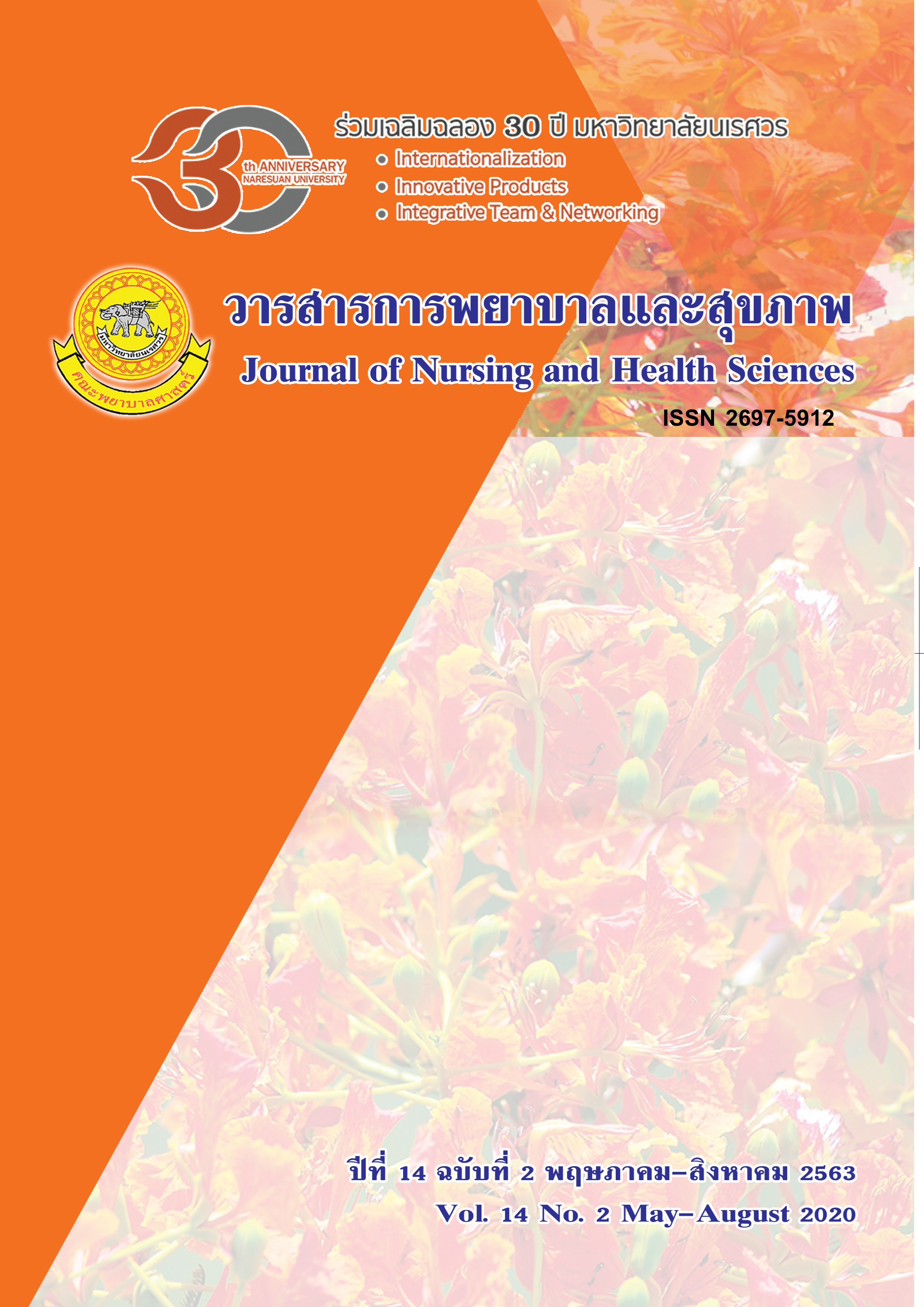การรับรู้ความสามารถตนเองของผู้สูงอายุที่เจ็บป่วยด้วยโรคเรื้อรัง
Main Article Content
บทคัดย่อ
การวิจัยเชิงพรรณนานี้ มีวัตถุประสงค์เพื่อศึกษาความสัมพันธ์ระหว่างคุณลักษณะส่วนบุคคล ภาวะสุขภาพ การ ปฏิบัติกิจวัตรประจำวันกับการรับรู้ความสามารถตนเองของผู้สูงอายุที่เป็นโรคเรื้อรังที่มารับบริการรักษาในโรงพยาบาล ส่งเสริมสุขภาพตำบลเกาะหงษ์ อำเภอเมือง จังหวัดนครสวรรค์ จำนวนขนาดกลุ่มตัวอย่างได้มาจากการใช้โปรแกรม G* Power 3.1 ได้เท่ากับ 133 คน เลือกกลุ่มตัวอย่างแบบเฉพาะเจาะจง (purposive sampling) เครื่องมือวิจัยเป็นแบบ สอบถาม ตรวจสอบความตรงโดยผู้ทรงคุณวุฒิ ทดสอบความเชื่อมั่นทั้งฉบับ 0.84 สถิติที่ใช้วิเคราะห์ข้อมูล ได้แก่ ร้อย ละ ค่าเฉลี่ย ส่วนเบี่ยงเบนมาตรฐาน และวิเคราะห์ความสัมพันธ์ไคสแควร์ ผลการศึกษา พบว่า กลุ่มตัวอย่างส่วนใหญ่เป็นเพศหญิง ร้อยละ 68.4 มีอายุระหว่าง 60 - 69 ปีร้อยละ 55.6 สถานภาพ สมรสคู่ ร้อยละ65.4 การศึกษาระดับประถมศึกษาร้อยละ 76.7 รายได้เฉลี่ยต่อเดือนน้อยกว่า 5,000 บาท ร้อยละ 66.9 ค่าดัชนีมวลกายระดับปกติ ร้อยละ 50.4 มีโรคอื่นร่วมมากกว่า 1 โรคร้อยละ 69.2 ระยะเวลาการเจ็บป่วยมากกว่า 3 ปีร้อยละ 50.4 สุขภาพจิตอยู่ในระดับปกติ ร้อยละ 57.9 การปฏิบัติกิจวัตรประจำวัน อยู่ในระดับติดสังคมร้อยละ 95.5 การรับรู้ความสามารถของตนเองอยู่ในระดับปานกลาง ร้อยละ 50.4 ความสัมพันธ์ระหว่างตัวแปรต่าง ๆ กับระดับการรับรู้ความสามารถตนเองพบว่า ระดับสุขภาพจิตมีความสัมพันธ์กับระดับการรับรู้ความสามารถของผู้สูงอายุที่เจ็บป่วย ด้วยโรคเรื้อรัง อย่างมีนัยสำคัญทางสถิติที่ระดับ .05 ข้อเสนอแนะบุคลากรทีมสุขภาพ ควรติดตามประเมินภาวะสุขภาพ ของผู้สูงอายุที่เจ็บป่วยด้วยโรคเรื้อรังโดยเพิ่มการประเมินในด้านสุขภาพจิต เป็นการเสริมการรับรู้ความสามารถตนเอง อาจจัดกลุ่มเพื่อนช่วยเพื่อนผู้สูงอายุได้แลกเปลี่ยนประสบการณ์ เข้ากลุ่มพูดคุย หรือเยี่ยมเยียนกัน
Article Details
เอกสารอ้างอิง
Aruntippaitune, S. (2017). The Madrid international plan of action on ageing : the United Nations framework for Thailand. Journal of Gerontology &Geriatric Medicine, 16, 80-86. Retrieved 7 December 2019 from https://journalggm.org/article_pdf-PA19016.pdf/. [In Thai].
Ban Ko Hong Health Promotion Hospital. (2020). Chronic disease clinic recipient report 2020. Nakhon Sawan: Ban Ko Hong Health Promotion Hospital. [In Thai].
Bandura, A. (1977). Self-efficacy: Toward a unifying theory of behavioral change. Psychological Review, 84(2), 191–215.
Boonman, N., Therawiwat, M., Imamee, N., & Tansakul, S. (2011). Self-efficacy, social support, and self-care behaviors regarding food consumption and exercise of the elderly club members, Kanchanaburi Province. The Journal of Health Education, 34(117), 51–68. [In Thai].
Burakhorn, N. (2018). The application of self-efficacy theory to change food consumption and exercise behaviors of hypertensive patients. In 2nd National Graduate School Conference 2018 (p. 429-441). Bangkok: Suan Sunandha Rajabhat University. [In Thai].
Dechasatit, P., Trisirirat, S., & Saengsuwan, J. (2013). Percieved self-efficacy about osteoporosis prevention among the elderly dwelling in community. In The 21st National Graduate Research Conference (p. 985-994). Khon Kaen: College of Local Government, KhonKaen University. [In Thai].
Foundation of Thai Gerontology Research and Development institute (TGRI). (2018). Situation of the Thai elderly 2016. Retrieved 7 December 2019 from http://resource.thaihealth.or.th/library/musthave/16626. [In Thai].
Jumpatade, N., Jamjun, L., & Faimuenvai, P. (2018). The Nurse’s role for apply self-efficacy theory in the elderly diabetic. HCU Journal of Health Science, 21(42), 153-164. [In Thai].
Lightsey, R. (1999). Self-efficacy: The exercise of control- By Albert Banduda. Journal of Cognitive Psychotherapy. 13(2), 158–165.
Minsiri, P., & Suksamran, A. (2019). Perceived self-efficacy among elderly people with a chronic disease in Phetchaburi Province. The Southern College Network Journal of Nursing and Public Health. 6(special), 69-79. [In Thai].
Piyaphotchanakorn, S., Kaewkungwal, P., Sompakdee, S., & Yimsook, N. (2015). Self-efficacy, job demands-job resources and burnout with perception of organizational justice as a moderating variable. Journal of Social Work. 25(1), 91-118. [In Thai].
Rakkarnngarn, P., Phitakphinichnan, W., & Chankin, P. (2013). Relationships among exercise self-efficacy, sociocultural internationalization, body image dissatisfaction, and exercise intention. Master Thesis (Science in Psychology), Chulalongkorn University, Bangkok. [In Thai].
Suksai, P., Nanthamongkolchai, S., Pitikultang, S., Munsawaengsub, C., & Taechaboonsermsak, P. (2018). Factors influencing mental health of the elderly in urban area, Ratchaburi Province. Journal of Health Science, 27(5), 809-818. [In Thai].
The Secretariat of The House of Representatives. (2016). The report of system reform to support the aging society. Bangkok: The Publisher of The Secretariat of The House of Representatives. [In Thai].
Vasuthada, C., Dechavoot, L., Jaikla, N., & Jarujit, S. (2018). The relationship between perception toward non- communicable diseases and health promotion behaviors for non-communicable diseases prevention among people in Muang District, Chanthaburi Province. Journal of Phrapokklao Nursing College, 29(2), 47-59. [In Thai].
Wongwai, P., Therawiwat, M., Imamee, N., & Pradipasa, M. (2011). Perceived self-efficacy and social support on self-care behaviors of hypertensive patients, Srakaew Province. The Journal of Health Education, 34(1), 69-81. [In Thai].


